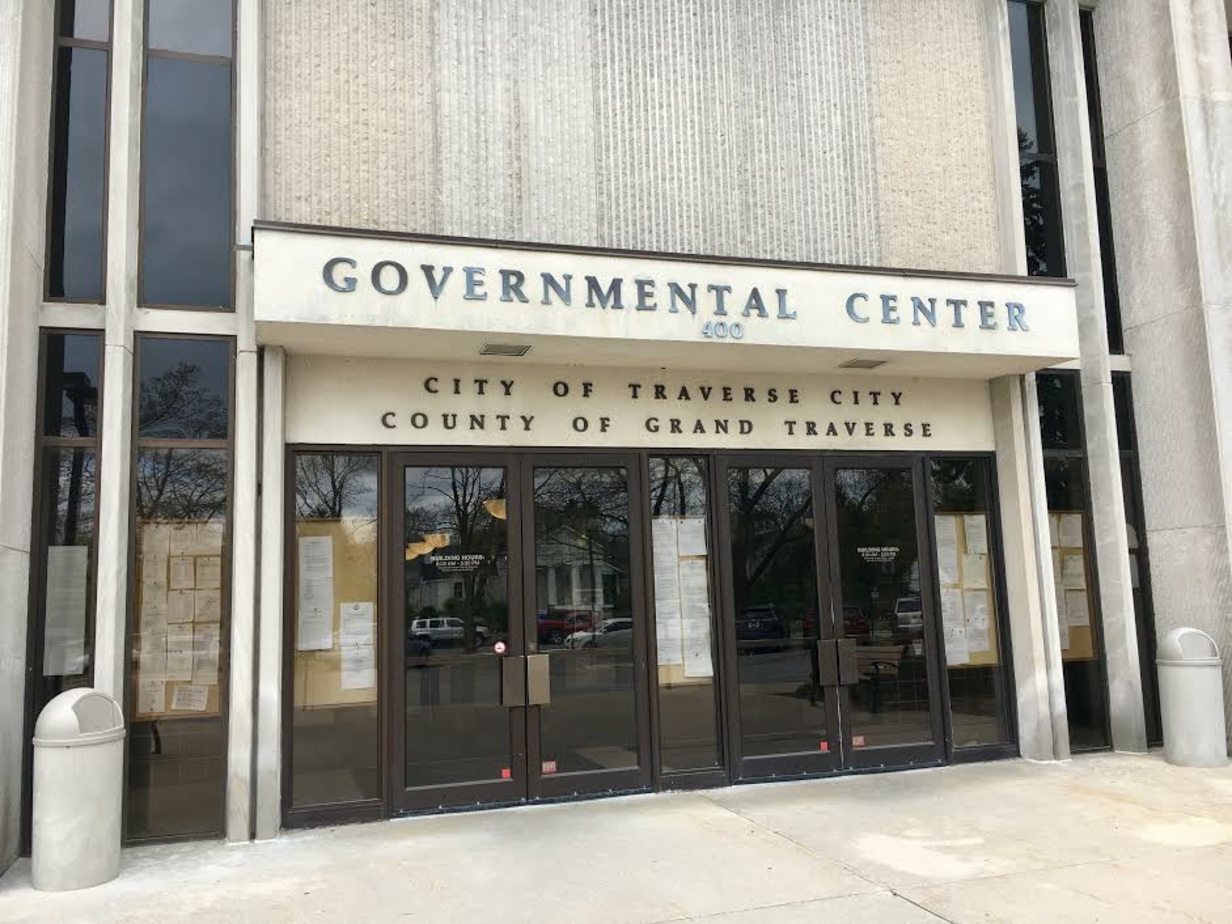
GT County Commissioners To Discuss Rules For Raising Own Wages, Eviction/911 Resolutions
By Beth Milligan | March 1, 2021
After Grand Traverse County commissioners voted in December to nearly double their own salaries – a move that came after 20 years of no increases, but was met with criticism by some commissioners and residents – the board Wednesday will consider adopting rules that restrict the timing of when future commissions can vote on wage increases. Commissioners Wednesday will also consider encouraging lawmakers to release funds for eviction prevention in Michigan and discuss a proposed new federal rule that could impact Grand Traverse 911 funding.
Commission Wage Increases
County commissioners voted 5-2 in December to increase commission compensation from $7,000 to $12,000 annually, with the board vice chair’s salary to increase from $7,500 to $12,500 and the chair’s salary from $8,000 to $13,000. The raise marked the first time since 2001 commission compensation has increased above the $7,000 level, with several commissioners noting the raise would put Grand Traverse County in line with other similar-sized counties and help recruit more qualified candidates to serve on the commission, given the time constraints involved in being on the board.
But Commissioners Bryce Hundley and Betsy Coffia, who opposed the proposal, questioned the optics of commissioners voting to give themselves hefty raises – particularly during a pandemic. While other municipalities, like the City of Traverse City, use an independent compensation commission to make recommendations on commission salaries, Grand Traverse County used an hoc committee of commissioners who ended up recommending their own increases. Hundley wants to avoid that scenario in the future by changing the board rules Wednesday to state that commissioners can only vote on wage increases prior to the primary election filing deadline, with the increases to go into effect at the start of the next term. With that change, it would be unknown who would receive the raises the following term, which would keep the increases non-partisan and non-personal, Hundley says.
“The primary filing deadline is the only way to get it far back enough so any of the seven of us (on the commission) wouldn’t know who would be on the next board,” says Hundley. “By the regular election, you could have people running unopposed and would know. I ran unopposed last time, Chair (Rob) Hentschel ran unopposed last time. So the primary filing deadline seemed like the right time.”
Hundley says that even though he opposed the December wage increase, he did so more because of the timing than objections to trying to adequately compensate commissioners for their work. “The way I am presenting this (rule change) to the board is not wagging my finger, but saying that while I understand we are trying to get to the right number, we have to weigh that against this issue of voting ourselves a raise,” he says. “In the future, this will keep us out of that thorny issue.”
Eviction Support
With a federal moratorium on evictions set to expire March 31 – and the CDC order being challenged in court, potentially hastening its end – Coffia requested that commissioners Wednesday discuss support for residents facing potential eviction. Coffia drafted a potential letter to be sent on behalf of commissioners to state representatives and Governor Gretchen Whitmer urging “a bipartisan agreement to immediately release the full $622 million in COVID Relief funds earmarked for eviction prevention in Michigan.” The Michigan Coalition Against Homelessness and Michigan League for Public Policy has also called for releasing funds for eviction prevention.
Coffia’s draft letter notes that Michigan has already been in receipt of federal funds for two months; the timing of their release has been part of ongoing negotiations between Whitmer and the legislature. “While we understand that there are sometimes different perspectives and times for bargaining, we believe this situation is beyond urgent for both landlords and tenants hit hard by the economic devastation of the last 12 months,” the letter states. “Our constituents cannot afford for the needed relief to become mired in bureaucratic red tape or partisanship.”
The letter states that on a local level, the Northwest Michigan Community Action Agency’s homelessness prevention team reported a high volume of calls September through December and are “seeing an alarming number of cases from people who never before have needed to access assistance from their agency.” Though NMCAA assisted 113 Grand Traverse County households with eviction diversion in a five-month period, grant funding is drying up and some families are being turned away due to income eligibility requirements, according to the letter. “We know that statistically once a person or family becomes unhoused, the likelihood increases that they will continue to experience housing instability and other crises that will leave them destabilized and in need of longer term social services. The goal here should be to keep people in their homes and prevent them from going down that path, and to give landlords needed relief as well,” the letter concludes.
911 Resolution
A proposed rule change under the Federal Communications Commission (FCC) could have significant implications for Grand Traverse 911 funding. According to a memo from Grand Traverse 911 Director Jason Torrey, the FCC is seeking comments on a proposal to change how 911 surcharge fees can be spent. The change appears to only allow fees to be spent on costs within actual 911 call centers. But Torrey notes that in Grand Traverse County, the voter-approved 911 surcharge fee helps cover costs for a wide array of equipment outside the 911 center, including the department’s entire fleet of portable and mobile radios and first responder paging equipment. “These systems are critical in allowing information sharing between 911 and first responders,” Torrey says.
While Torrey supports the intent of the FCC change – to cut down on jurisdictions diverting 911 surcharge fees to non-911 purposes – he says Michigan already has a “strong reputation” for combatting fee diversion by maintaining a list of allowable/disallowable purchases for 911 departments. The state supports using surcharge fees to cover the “911 ecosystem” – which includes mobile radio and paging equipment – while the FCC change more narrowly focuses on costs strictly within the 911 center. Torrey is asking county commissioners to approve a resolution of support for an expanded FCC definition of equipment "directly related to the 911 process" and to support local decision-making control regarding the use of 911 fees.
Comment






